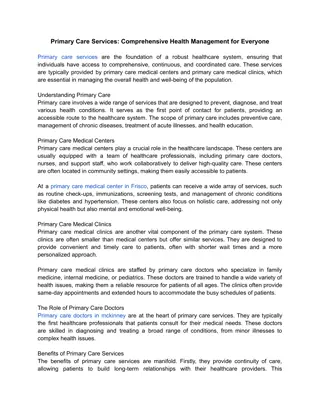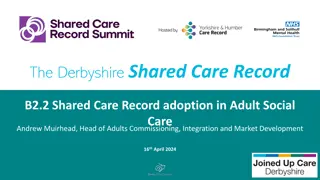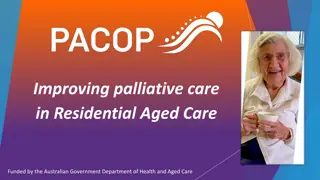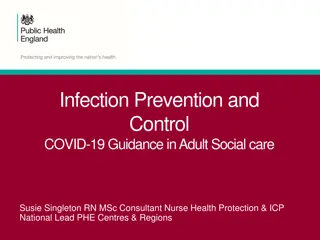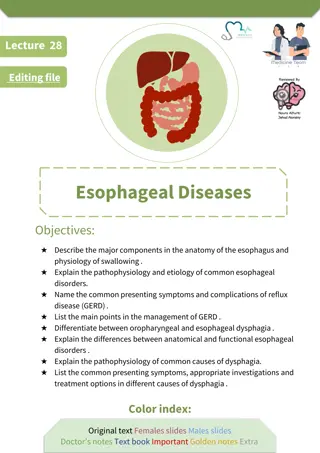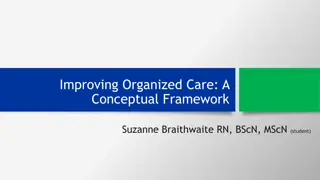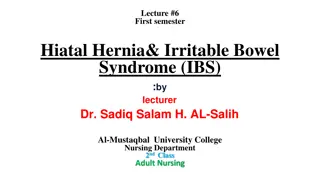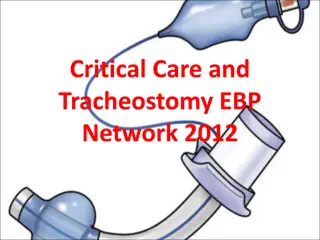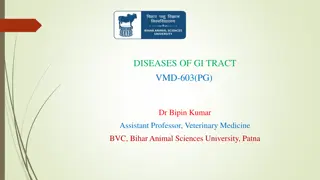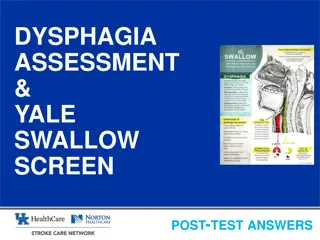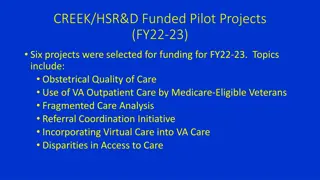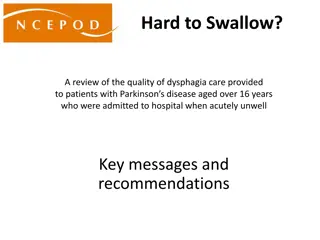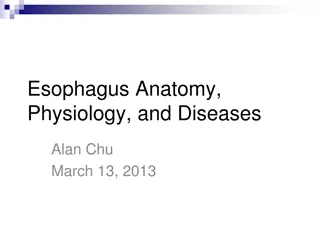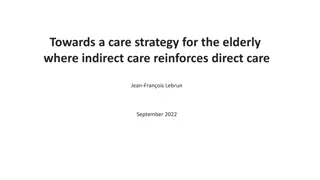Integrating Behavioral Health in Primary Care: Collaborative Care Model (CoCM) Approach
Explore the Collaborative Care Model (CoCM) and Behavioral Health Integration in Primary Care discussed at the North Carolina Community Health Care Association Clinical Conference. Learn about key objectives, roles, billing codes, and resources to promote overall health and reduce treatment gaps and
2 views • 35 slides
Quick MD Care_ Your Trusted Partner in Primary Care Medicine
Quick MD Care: Your Trusted Partner in Primary Care Medicine\n\nWelcome to Quick MD Care, where compassionate primary care meets convenience. We understand the importance of having a trusted partner in managing your health. Our team of dedicated primary care doctors is committed to providing persona
5 views • 2 slides
Health Care Facilities
Explore a comprehensive guide to various health care facilities, including hospitals, long-term care facilities, medical offices, and clinics. Learn about the types of hospitals, such as general, specialty, government, and university hospitals. Discover the functions of long-term care facilities lik
0 views • 9 slides
Understanding Proportionate Care in Healthcare
Explore the concept of Proportionate Care, previously known as Single-Handed Care, which aims to increase capacity in the care market, reduce delayed transfers of care, and improve service user outcomes. Addressing common concerns and myths related to moving and handling tasks, this approach promote
0 views • 10 slides
Primary Care Services: Comprehensive Health Management for Everyone
Primary Care Services: Comprehensive Health Management for Everyone\n\nPrimary care services are the foundation of a robust healthcare system, ensuring that individuals have access to comprehensive, continuous, and coordinated care. These services are typically provided by primary care medical cente
2 views • 2 slides
Understanding The Differences Between Hourly Care and Live-In Care
Choosing the right type of Home Health Aide NJ for your loved one can be challenging. Whether you need occasional support or constant supervision, understanding the differences between hourly care and live-in care is crucial for making the best decision.\n\nFor more info visit: \/\/carebridge.care\/
1 views • 6 slides
The Derbyshire Shared Care Record: Integration in Adult Social Care
The Derbyshire Shared Care Record B2.2 adoption in Adult Social Care under the leadership of Andrew Muirhead is a significant initiative enhancing care quality and delivery. This project involves multiple agencies like Derby City Council, Derbyshire County Council, and healthcare trusts to integrate
0 views • 12 slides
Understanding Palliative Care: Enhancing Quality of Life in Serious Illness
Palliative care is a holistic approach focused on improving the quality of life for patients and their families dealing with life-threatening illnesses. It involves early identification, assessment, and treatment of pain and other physical, emotional, and spiritual issues. This comprehensive trainin
0 views • 60 slides
Understanding Thickened Liquids in Dysphagia Management
Thickened liquids are often recommended for residents with swallowing difficulties to prevent aspiration pneumonia. Recommendations are typically made by speech pathologists, with nursing sometimes adjusting based on availability of therapy. Aspiration pneumonia occurs when substances are inhaled in
2 views • 33 slides
Child Care and Youth Programs at Minot AFB
Offering a range of child care services including Child Development Center for ages 6 weeks to 5 years, School Age Care for Kindergarten to 12 years, Family Child Care Program, and Youth Programs for ages 9-18. Services include full-time care, before/after school care, extended duty care, emergency
1 views • 6 slides
Developing a Self-Care Action Plan for Overall Well-Being
Self-care involves deliberate activities to nurture mental, emotional, physical, and spiritual health, yet it is often neglected. This guide explores the essence of self-care, emphasizes the importance of building a personalized self-care action plan, and provides insights into taking care of your b
0 views • 19 slides
Enhancing Palliative Care in Australian Residential Aged Care
PACOP, funded by the Australian Government Department of Health and Aged Care, is a program focused on improving palliative care in residential aged care facilities. It involves standardized assessment practices, early identification of care needs, and a collaborative model for sustainable support.
0 views • 10 slides
North Central London Integrated Care System Overview
The North Central London Integrated Care System (ICS) is a collaborative approach to healthcare planning and delivery across five boroughs. Led by the North Central London Health and Care Partnership, the ICS aims to meet the diverse health, public health, and social care needs of the region through
0 views • 29 slides
Priorities and Quality Measures for Type 2 Diabetes Care in NHS GGC
Dr. Kashif Ali leads primary care for Type 2 diabetes, while Dr. James Boyle oversees secondary care in NHS GGC. The data from December 2018 shows the number of Type 2 diabetes patients, their care processes, HbA1c levels, and BMI status. The Diabetes Quality Improvement and Outcome Measures aim to
0 views • 27 slides
Adult Social Care Guidance on COVID-19 Prevention and Control
Infection prevention and control are crucial in adult social care, especially during the COVID-19 pandemic. This guidance, led by Susie Singleton RN MSc, provides resources and practical insights to help care providers and staff understand and implement effective measures. The resources cover topics
0 views • 12 slides
Understanding Dysphagia in the ICU: Assessment and Impact
Dysphagia, the difficulty in swallowing, is a common issue in the ICU, affecting a significant percentage of intubated patients. It increases mortality, risk of pneumonia, malnutrition, and prolongs hospital stays. Assessment methods like bedside evaluation and FEES are crucial in managing dysphagia
5 views • 8 slides
Comprehensive Guide to Barium Swallow Procedure
Barium swallow is a dedicated test to evaluate the pharynx, esophagus, and proximal stomach. It helps diagnose conditions like dysphagia, obstructions, and motility disorders. This guide covers the indications, contraindications, preparation, contrast agents used, and evaluation steps for the proced
0 views • 13 slides
Child Care Challenges in Kentucky: The Child Care Cliff
Explore the landscape of child care in Kentucky, revealing the challenges families face with the Child Care Cliff. Discover statistics on child care centers, family child care homes, and the average cost of child care in Kentucky. Understand the importance of the Child Care Assistance Program (CCAP)
0 views • 18 slides
Understanding Esophageal Diseases: Anatomy, Physiology, and Disorders
Explore the anatomy and physiology of the esophagus, learn about common esophageal disorders such as GERD, understand the symptoms, complications, and management of reflux disease, differentiate between oropharyngeal and esophageal dysphagia, and delve into the causes, symptoms, investigations, and
2 views • 16 slides
Understanding Achalasia: Therapeutic Approaches, Pathophysiology, and Clinical Manifestations
Achalasia is characterized by a failure of the lower esophageal sphincter to relax, leading to difficulty in swallowing and regurgitation. The exact cause is unknown, but autoimmune factors and chronic infections may play a role. Symptoms include dysphagia, chest pain, regurgitation, and weight loss
0 views • 59 slides
Assisting with Oral Feeding, Dysphagia Management, and Enteral Tube Feeding in Healthcare
This content covers essential aspects of assisting with oral feeding for individuals at risk for aspiration, managing dysphagia with specific recommendations and diet progression, and enteral tube feeding procedures and complications. It emphasizes safety, dignity, and independence in feeding practi
3 views • 12 slides
Assisting with Enteral Tube Feeding and Dysphagia Management
This content covers essential information on assisting with oral feeding for patients at risk of aspiration, managing dysphagia, diet progression, and enteral tube feeding procedures. It emphasizes safety, independence, and dignity in feeding practices. The content includes tips for preventing aspir
0 views • 12 slides
Managing Eating and Swallowing Challenges After Stroke
Dysphagia, a common issue after a stroke, can lead to difficulty swallowing and may require texture modifications in food and fluids for safety. Up to 65% of stroke survivors may experience dysphagia, which can lead to complications like pneumonia. Proper oral care, mealtime positioning, and awarene
0 views • 9 slides
Understanding Organized Care in Primary Care Settings
Organized Care refers to a natural community of caregivers with a shared commitment to proactive population and individual care management. Through effective and efficient practices, it serves the needs of patients across various settings and over time, with aligned goals and provider accountability
0 views • 18 slides
Understanding Thickened Fluids in Aged Care Facilities
Exploring the adequacy of thickened fluids in residential aged care settings, a study examined staff perceptions, preparation factors, adherence to IDDSI standards, and issues related to dysphagia. Findings revealed barriers, enablers, and the importance of staff education and support in ensuring th
0 views • 7 slides
Understanding Dementia and Speech Therapy by Vincent Delgiudice
Dementia impacts speech, swallowing abilities, and quality of life. Vincent Delgiudice, a certified SLP, offers therapy to enhance memory, communication, and safe swallowing strategies. Dysphagia in dementia needs evaluation for proper treatment. Learn about types of dementia symptoms and different
0 views • 19 slides
Understanding Hiatal Hernia and Irritable Bowel Syndrome (IBS) for Adult Nursing
A hiatal hernia involves the protrusion of the stomach through the diaphragm, leading to various types and complications. Symptoms may include heartburn and dysphagia, diagnosed through barium studies and endoscopic exams. Management includes lifestyle changes, medication, and surgical repair. Nursi
0 views • 15 slides
Evidence-Based Practice in Critical Care: Focus on FEES in Dysphagia Management
This presentation outlines the activities of the Critical Care and Tracheostomy EBP Network in 2012, including a review of the year, changes in leadership, and discussions on the use of Fiberoptic Endoscopic Evaluation of Swallowing (FEES) in critical care settings. Various research articles are dis
0 views • 16 slides
Overview of Aged Care Reforms in May 2014
Aged Care Reforms in May 2014 introduced significant changes to the aged care sector in Australia. The reforms aimed at providing quality care for older Australians, reducing red tape, and enhancing services such as Home Care Packages, MyAgedCare, and the Australian Aged Care Quality Agency. Changes
0 views • 45 slides
Minot Air Force Base Family Child Care Programs
Offering a variety of child care services including Child Development Center (CDC) for infants to 5 years old, School Age Care (SAC) for Kindergarten to 12 years, Youth Programs for ages 9-18, and Family Child Care Program (FCC) for infants to 12 years. Additional programs include Extended Duty Care
0 views • 6 slides
Approach to Dysphagia: Esophageal Cancer & Achalasia Cases
This presentation covers the diagnostic approach and management strategies for dysphagia in a 65-year-old patient presenting with symptoms such as odynophagia, cough, hoarseness, and lymphadenopathy. It discusses the use of CBC, CXR, ECG, upper GI endoscopy, CT, and biopsy in assessing the location,
0 views • 38 slides
Comprehensive Overview of Medical Terminology in Gastrointestinal System
This content provides a detailed exploration of medical terminology related to the gastrointestinal system. It covers definitions, word roots, combining vowels, suffixes, and prefixes commonly used in this medical field. The material includes information on anatomical terms such as anus, appendix, c
0 views • 18 slides
Impacts of Marketisation on Home Care for Older People in Urban China
This study by Wenjing Zhang from the University of Bristol delves into the effects of the marketisation process on home care for the elderly in urban China. It explores the rationale behind the marketisation of care, the trends in home care marketisation, and the processes involved. The background s
0 views • 19 slides
Equine Gastrointestinal Tract Disorders and Dysphagia Overview
This informative content covers various diseases of the gastrointestinal tract in horses, including oral cavity conditions, dysphagia, sialadenitis, and esophageal disorders like choke. It discusses anatomical classifications, causes, clinical manifestations, and treatment approaches for these condi
0 views • 19 slides
Dysphagia Assessment & Yale Swallow Screen Post-Test Answers
Dysphagia assessment is crucial in identifying swallowing dysfunction. The post-test answers cover various aspects including definitions, statistics, patient management, and protocols like the Yale Swallow Screen. It emphasizes the importance of oral care, appropriate diet modifications, and when to
0 views • 12 slides
VA Healthcare Pilot Projects FY22-23
Six VA-funded pilot projects for FY22-23 focus on improving obstetrical quality of care, outpatient care utilization by Medicare-eligible veterans, fragmented care analysis, referral coordination, virtual care integration, and addressing disparities in access to care. Projects include assessing obst
0 views • 7 slides
Review of Dysphagia Care for Parkinson's Patients in Hospital
A review was conducted on the quality of dysphagia care provided to patients with Parkinson's disease aged over 16 years who were admitted to the hospital when acutely unwell. Key findings include the importance of documenting swallow status in referral letters, screening patients for swallowing dif
0 views • 24 slides
Understanding Esophagus Anatomy, Physiology, and Diseases
Explore the anatomy and function of the esophagus, including its layers, innervation, and common disorders like dysphagia, motility disorders, strictures, and rings/webs. Learn about diagnostic methods such as barium swallow studies and endoscopy, as well as treatment options for conditions like ach
0 views • 18 slides
Enhancing Elderly Care: Direct and Indirect Support Strategies
Implementing a care strategy for the elderly involves integrating both direct, personal care activities and indirect care tasks. This approach benefits two key target audiences, including millions with varying levels of dependency and informal carers. The positive impacts of indirect care include we
0 views • 7 slides
Understanding Subacute Care: Types of Residents and Care Settings
Subacute care involves providing specialized care for individuals who require more attention than what typical long-term care facilities can offer. This level of care is provided in settings like hospitals or certain units within long-term care facilities. Residents in subacute care settings need a
0 views • 62 slides




